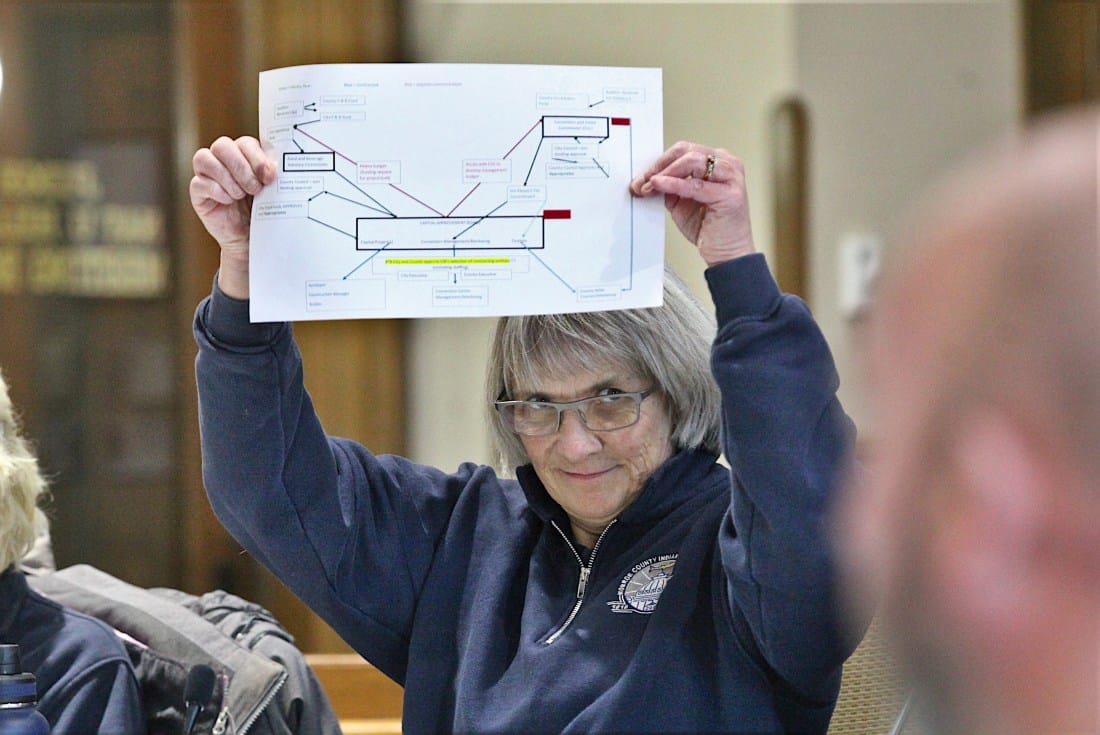City, county weaving web of agreement for convention center governance in 2020


After months of disagreement between city and county officials, in the last couple weeks, the choice of governance for the $59-million expansion of Monroe County’s convention center has settled on the formation of a capital improvement board (CIB).
A CIB is enabled under the state statute as an entity that county commissioners can create through enacting an ordinance.
At a Thursday late afternoon meeting that wrapped up in about an hour, Monroe County and Bloomington officials continued reviewing some of the gnarlier details of an interlocal agreement that is planned to supplement the statutory requirements for the CIB.
The outcome of the meeting is that county attorney Jeff Cockerill and Bloomington’s corporation counsel, Philippa Guthrie, will be working just before year’s end or in the first few days of next year to put together a draft of the interlocal agreement.
Elected officials have set a next meeting for Jan. 13.
The day before Thursday’s session (Dec. 18), county commissioners put off their consideration of a CIB ordinance to their next regular meeting, on Jan. 8.
At Thursday’s session, commissioner Julie Thomas said she didn’t want to enact the CIB ordinance without an interlocal agreement in place. The agreement would have the mayor, the city council, the county council and the county’s board of commissioners as signatories.
One possibility floated by Thomas was that the ordinance would be enacted contingent on the signing of the interlocal agreement.
One example of a topic to be addressed in the interlocal accord is the statutory requirement that the CIB has to submit its annual budget for “review, approval, or rejection to the fiscal body of the county…” Under the statute means the county council would need to approve the CIB’s budget.
Bloomington wants a to play a parallel role, given that the construction of the expansion project will be funded with proceeds from the city’s share of the now two-year-old food and beverage tax. So the role of Bloomington’s city council in the CIB’s budget approval will need to be spelled out in the interlocal agreement.
The same principle applies to the convention and visitors commission (CVC), which already exists and operates the current facility at College Avenue and 3rd Street with proceeds from the county’s innkeeper’s tax. Under the interlocal agreement, the CVC will have its budget approved by both the county council and the city council.
Grounding the initial conversation on Thursday was a diagram, characterized as a “spider web” showing the connections between the varies entities involved.
Other topics addressed at the meeting included how the city and county both will need to transfer their land to the CIB, then lease it back from the CIB. That’s so that neither the county or the city’s constitutional debt limit. That limit is 2 percent of the value of the taxable property in the geographic area of the respective governmental units.
The city and county each own a few parcels in the immediate vicinity of the planned convention center expansion. The ownership of various parcels was topic that was discussed at Thursday’s meeting as related to the choice of a hotelier for the project.
Hotelier incentives aren’t included on the city’s list of items it wants considered for incorporation into the interlocal agreement, commissioner Penny Githens pointed out on Thursday.
Bloomington’s deputy mayor, Mick Renneisen, said the written agreement needs to be circumspect on the topic of what incentives might be available. “We don’t want to tip our hand,” he said. After a hotel partner is picked, Renneisen said, “There’s going to be an ask of all parties involved for additional incentives.”
Click to view slideshow.



Comments ()